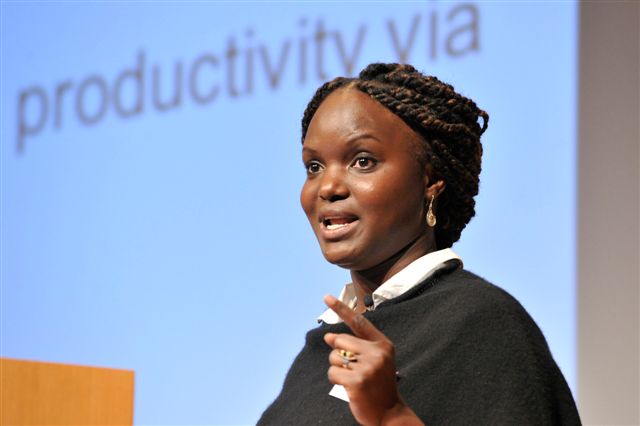“I watched as the standard of living in my household and that of my friends drastically declined in the span of 20 years even though my mother invested in two houses, was promoted at work and got raises in her salary. We quit eating breakfast as bread, butter and milk became too expensive…I knew that something was wong and wondered how I could help make it right, especially when I saw the number of people living on the streets or in the slums, even though some had Masters Degrees from universities…I also wondered if corruption was genetic and Africans were naturally prone to more corruption. Perhaps the corruption in the halls of power was eating away at our potential to create wealth.” – Musings of then 24-year old Kenyan, June Akinyi Arunga, in 2005.
Growing up in Nakuru, Kenya, June Arunga had witnessed increasing poverty and the helplessness that accompanied it in an environment where the government was expected to address every social ill. June moved from Nakuru to Nairobi at age 14 and then left Kenya to go to university in the United Kingdom at age 22.
June graduated with a law degree from the University of Buckingham in England after studying law initially at the University of Nairobi, Kenya. In her quest to answer the question, “Why is Africa so poor?” June engaged with some of Africa’s toughest terrains, journeying through conflict zones in Egypt, Sudan, Congo, Angola, Namibia and South Africa, in a BBC-produced documentary called The Devil’s Footpath. Her journey culminated in the living room of Archbishop Desmond Tutu, where she candidly posed her question to the leader. As a journalist she has participated in numerous other documentaries, radio and television programmes, including one with former President of Ghana, Jerry Rawlings, where they attempted to expose the roots of Africa’s underdevelopment. However, Arunga has not only concerned herself with asking questions or blaming the government, she has gone on to create solutions.
A lot has changed for June Arunga since her early years in Nakuru, Kenya. She is now the Founder and President of Open Quest Media LLC, a multimedia production company, and an equity partner and co-Founder of Black Star Line SA, a technology solutions provider in the field of mobile phone-based payments and money transfer, particularly targeting African entrepreneurs. The journalist-lawyer-entrepreneur was named by Forbes Magazine as one of its 20 Youngest Power Women in Africa and one of Fast Company’s 100 most Creative People in Business.
When Arunga was contacted by the BBC to host its documentary, she was still in law school and pleasantly surprised. She took time off her studies to embark on the journey of a lifetime. For her, the experience was an eye-opener to the challenging and often perilous conditions many Africans lived under. It was also an insight into the resilience of the human spirit as many were hospitable and warm despite living in conditions of extreme poverty. The most important lessons she learned have shaped her entrepreneurial efforts and reflect in her speeches on globalisation and economic freedom.
“The biggest things I learned were that there is so much work to be done in Africa and that Africans must help themselves. We can no longer afford to rely on rich countries to provide us with foreign aid. It’s the person who the shoe pinches who knows how it needs to be adjusted”
Influenced by her experiences travelling Africa and her mother’s teaching on personal responsibility, June co-Founded Black Star Line SA with Herman Chinery-Hesse, a software engineer often referred to as “Bill Gates of Ghana”, in 2009. June had observed the rapid increase in mobile phone usage in both urban and rural Africa due to liberalisation of the sector and saw an opportunity to boost entrepreneurship by creating a platform for business owners to exchange goods, services and money. By giving business owners access to a global market and an understanding of how banking works, Arunga works to solve the problems of getting goods and services to the market for consumers to purchase while addressing payment and money management issues.
It comes as no surprise that the 31-year old now runs a multimedia production company. Her experience with documentary film-making and the power of the African narrative makes telling stories a priority. Her answers to the question “Why is Africa so poor?” have steadily evolved from her background in journalism, law and entrepreneurship into an understanding that a lack of protection of rights to own land and the products of one’s labour and the corruption it breeds, a situation faced by many Africans, continues to keep the continent in economic bondage. June Arunga regularly speaks on globalisation and liberalisation, African empowerment and protection of property rights as important keys to breaking the cycle of poverty.








